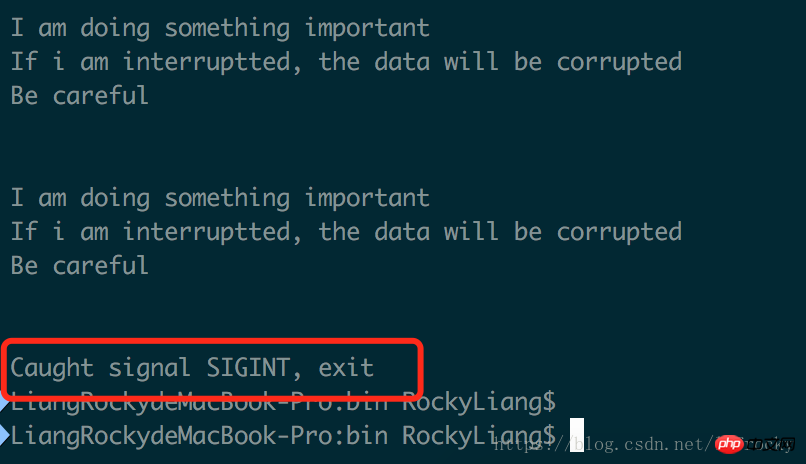
This article mainly introduces PHP process signal processing, which has certain reference value. Now I share it with everyone. Friends in need can refer to it
Copy after login
Assumptions Now we have the above PHP script. We want the script to output a piece of information and end the script when it receives process signals such as SIGINT and SIGTERM. How to achieve this?
Just use the pcntl_signal and pcntl_signal_dispatch functions (note that PHP needs to install the pcntl extension to use these two functions), see the code:
'SIGHUP', 2 => 'SIGINT', 3 => 'SIGQUIT', 4 => 'SIGILL', 5 => 'SIGTRAP', 6 => 'SIGABRT', 7 => 'SIGEMT', 8 => 'SIGFPE', //9 => 'SIGKILL', 10 => 'SIGBUS', 11 => 'SIGSEGV', 12 => 'SIGSYS', 13 => 'SIGPIPE', 14 => 'SIGALRM', 15 => 'SIGTERM', 16 => 'SIGURG', //17 => 'SIGSTOP', 18 => 'SIGTSTP', 19 => 'SIGCONT', 20 => 'SIGCHLD', 21 => 'SIGTTIN', 22 => 'SIGTTOU', 23 => 'SIGIO', 24 => 'SIGXCPU', 25 => 'SIGXFSZ', 26 => 'SIGVTALRM', 27 => 'SIGPROF', 28 => 'SIGWINCH', 29 => 'SIGINFO', 30 => 'SIGUSR1', 31 => 'SIGUSR2', ); /** * 进程信号处理函数 * @param int $signo 信号ID */function signalHandler($signo) { if (isset($GLOBALS['G_SIG_MAP'][$signo])) { echo "Caught signal {$GLOBALS['G_SIG_MAP'][$signo]}, exit\n"; } else { echo "Caught unknown signal:$signo"; } exit(); }foreach ($GLOBALS['G_SIG_MAP'] as $id => $name) { pcntl_signal($id, 'signalHandler'); }while (1) { echo "I am doing something important\n"; echo "If i am interruptted, the data will be corrupted\n"; echo "Be careful\n"; echo "\n\n"; pcntl_signal_dispatch(); // 此函数调用必须放在循环体内 sleep(5); }

Execute this in the linux shell script, and then use thekill -2 script process IDcommand to send a signal to the process. The script outputs the information normally and exits.
Related recommendations:
Detailed explanation of PHP inter-process communication
Semaphore and shared memory communication based on PHP process communication
Contents related to PHP process lock
The above is the detailed content of PHP process signal handling. For more information, please follow other related articles on the PHP Chinese website!




